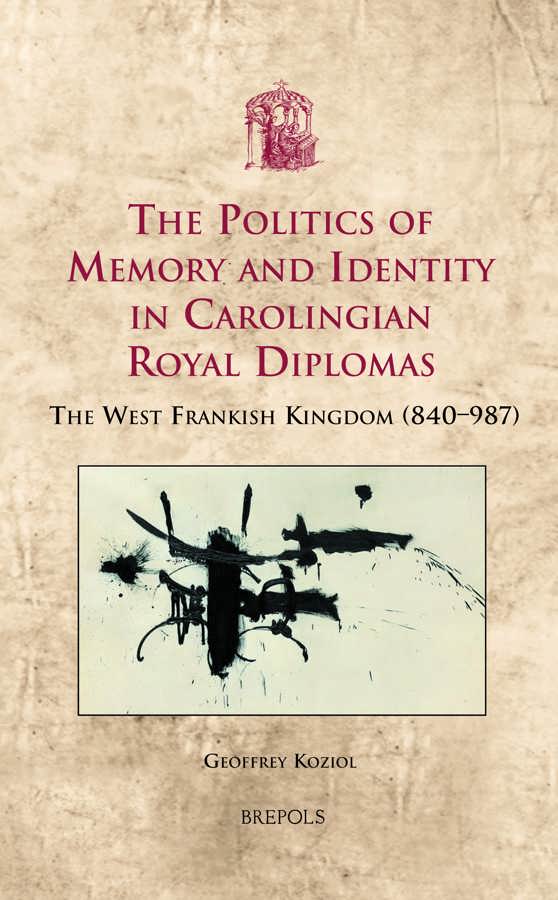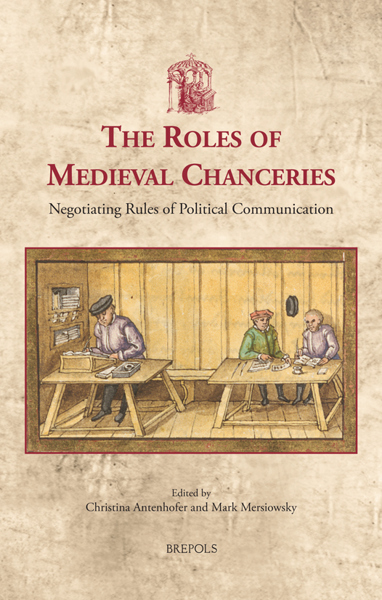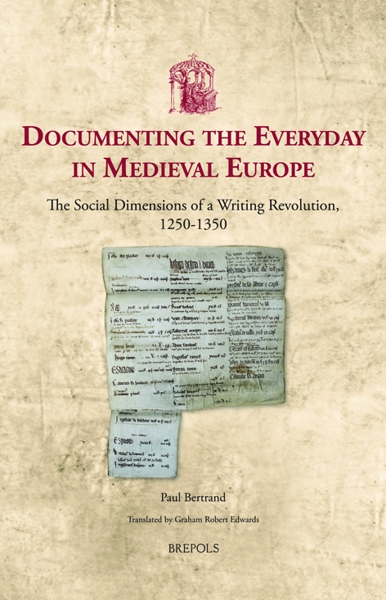
The Politics of Memory and Identity in Carolingian Royal Diplomas
The West Frankish Kingdom (840-987)
Geoffrey Koziol
- Pages: xix + 661 p.
- Size:156 x 234 mm
- Illustrations:10 b/w
- Language(s):English
- Publication Year:2012
- € 120,00 EXCL. VAT RETAIL PRICE
- ISBN: 978-2-503-53595-1
- Hardback
- Available
- € 120,00 EXCL. VAT RETAIL PRICE
- ISBN: 978-2-503-56037-3
- E-book
- Available
"Spoiler alert: Geoffrey Koziol has written a magnificent and rich examination of west Frankish politics from the reign of Charles the Bald to the end of the Carolingian line in 987. (...) More broadly, Koziol's study makes a fundamental contribution to the ongoing reevaluation of Carolingian political culture." (Hans J. Hummer, in H-France Forum, Volume 8, Issue 1 (Winter 2013), N° 1)
"His innovative argument will attract controversy, as any important argument would, but Koziol's enterprise is heroic. (...), the overall vision that emerges from this volume, unscathed, is riveting." (Brigitte Bedos-Rezak, in H-France Forum, Volume 8, Issue 1 (Winter 2013), N° 2)
"After reading Geoffrey Koziol’s latest book, this reviewer would like to turn to the audience, especially his French colleagues, and exclaim, voici, une merveilleuse histoire de la France ou plutôt de la Francia occidentalis de 840 à 987." (Herwig Wolfram, in The Catholic Historical Review, Vol. 99, n° 2, April 2013, p. 334-335)
"Memory and Identity confirms Koziol's reputation as one of the foremost scholars in the early Middle Ages, and no-one should be surprised that it is a book which demands close and repeated reading, and one which will stimulate vigorous debate." (Kathryn Dutton, in: Reviews in History, September 2012, http://www.history.ac.uk/reviews/review/1326)
"This book will profoundly affect the way that we understand the history of the west Frankish kingdom, and certainly the way that the scholarship understands diplomas. It is a brilliant and extremely important piece of work that will change our picture of an important transitional period." (Warren C. Brown, in: The Medieval Review, 12.11.12)
"Für jeden, der sich mit der Geschichte des Westfränkischen Reiches und mit der Karolingerzeit überhaupt befasst, stellt K.s äußerst anregendes Buch eine Pflichtlektüre dar." (Irmgard Fees, in: Deutsches Archiv für Erforschung des Mittelalters Band DA 71-1, 2015, p. 237-238)
“The book fully matches the fine standards of the Utrecht Studies in Medieval Literacy series. Koziol presents a careful, compelling and complex conceptual argument, teeming with suggestive possibilities for new research.” (Theo Riches, in Early Medieval Europe, 24.2, 2016, p. 253)
“Il volume di Geoffrey Koziol è senza dubbio un’opera importante (…) Lo studio ha quindi il merito di aprire nuovi possibili percorsi di ricerca e, al contempo, di stimolare un proficuo e fruttuoso dibattito.” (Paolo Tomei, in Studi Medievali, 57, 2016, p. 813)
Based upon a ‘performative’ interpretation of royal charters, The Politics of Memory and Identity offers a new and surprising narrative of West Frankish history from the death of Louis the Pious in 840 to the demise of the Carolingian dynasty in 987. The key is a carefully contextualised analysis of the circumstances in which kings issued charters and an alert examination of the charters’ verbal and visual semiotics. For which monasteries and cathedrals did kings issue diplomas and under what conditions? Who were the patrons who interceded for the recipients of diplomas and what titles were they given? Which kings were named as predecessors and which were omitted? Such clues allow us to recover the meaning of events whose significance was concealed by chroniclers, and to find unsuspected continuities in 150 years of West Frankish politics. They allow us to see a ruthless exercise of power in the use of forgeries and a commitment to political reform in the reform of monasteries. They reveal the long shadow cast by the reign of Charles the Bald in West Frankish history and the importance of a handful of monasteries as ‘sites of memory’. Above all, an intertextual reading of diplomas shows that political leaders in the kingdom made decisions based on policy, where the policy was articulated in terms of lessons drawn from their understanding of the past, and diplomas were the records that conveyed the lessons.
Acknowledgments xi
Abbreviations xiii
List of Plates xvii
Maps xix
Introduction 1
Part One: Instruments of Power 9
Chapter 1. Charters, Diplomas, and Performative Acts 17
- Diplomatik and Urkundenforschung 17
- Performative Acts 42
- Diplomas as Performative Acts 52
- Becoming King 63
- Charles the Bald at Toulouse (844) 69
- Charles the Fat (885) 74
- Odo (889) 81
- Louis IV d’Outremer (936) 85
- A Commitment to Kingship 91
- Mimesis, Quotation, and Succession 97
- Pippin II of Aquitaine (839) 99
- Lothar II in Provence (863) 105
- Charles the Bald in Lotharingia (869) 108
- Louis II the Stammerer (877) 111
- Establishing Succession 115
- Diplomas and the Narrative of Decline 119
- The Early Diplomas (840-843) 125
- Charles the Bald and his Loyalists (858-859) 130
- Adalard, Vivian, and Tours (843-845): The High Politics of Diplomas 140
- Charles and Erispoë (856) 150
- The Low Politics of Diplomas: Ebroin and Glanfeuil 154
- Ragamfrid’s Forgeries 162
- Writing and the Reform Councils 171
- Diplomas and the Selective Application of Reform 179
- Diplomas and the Palatines (869-877) 187
- Towards a Politics of the Past 213
- Trends and Transformations 215
- A Kingship of Alliances 223
- Alliance Acts 231
- Charles the Simple and the Margraves 236
- Raoul at Chalon (924) 247
- Louis IV and the Vermandois Settlement (943) 252
- Louis IV’s Restoration at Chevregny (946) 256
- Louis IV, Artald, and Saint-Remi (940) 258
- Lothar and Flanders 259
- New Directions 261
- Amicitia and the Problem of Unity 263
- Amicitia and Monastic Reform 272
- Cluny and Déols 279
- Acfred’s Revenge: Sauxillanges 285
- The Pater et dux monachorum 287
- Closing the Circle: The Pilgrimage of Louis d’Outremer (941-942) 294
- Homblières 301
- Diplomas, Monasteries, and the Kingdom 307
- Understanding Forgery 315
- Carolingian Truth: History 324
- Carolingian Truth: Commemoration 332
- Carolingian Truth: Oaths and Trials 340
- Cartae falsae 352
- The Forgeries of Adalgarius 358
- The Le Mans Forgeries 365
- Repudiating Boso 381
- Humiliating Sint-Baafs 391
- Testing triuwe 398
Chapter 8. The Song of Robert of Neustria 409
- Stories, Memories, and Diplomas 409
- The Robertians in Historiography 415
- The Background of the Revolt 425
- Northmen and Margraves 429
- Robert’s Saint-Denis 439
- The ‘Deposition’ 445
- The Diploma of 25 January 923 447
- The Judgment of Soissons 459
- The Simplicity of the Dove 461
- Herbert and Hagano 465
- Fulk and Adelaide 470
- Dynastic Pride 479
- Carolingian Destiny and Gelasian Majesty 481
- Legitimacy 492
- The Early Acts for Robert and Richard 501
- The Resurrection of Reform 504
- Lay Abbacies and Royal Prerogative after 911 511
- Monasteries and Memorialising 517
- The Voice of Charles 524
- The Last Diplomas 529
- Lieux de Mémoire 535
- Carlopolis 541
- Charles the Simple’s Politics of Memory 544
- Revenge 548
Bibliography 565
Plates 621
Index 631




